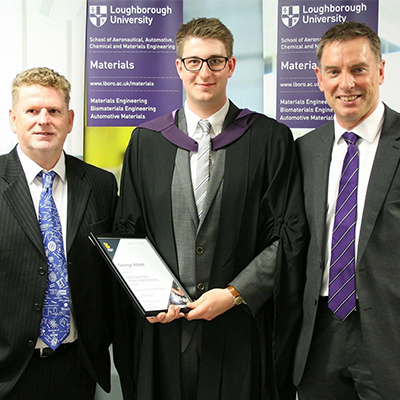Preventing workplace hazards
Start investigating – After studying Materials Engineering at Loughborough, George Alliot is now working for the British government, where he uses his expertise to investigate hazards and accidents in the workplace.
Materials matters – it teaches us what things are made of. By integrating physics, chemistry, maths and biology with engineering, materials scientists can address global challenges relevant to society today. Many sectors rely on materials scientists and engineers for the advanced knowledge of materials to design more environmentally friendly packaging, faster computers and safer cars.
Safety first

Loughborough Materials graduate George Alliott is now working for the UK government, where he uses his degree to help prevent hazards and accidents in the workplace:
I am currently working for the British government at the Health and Safety Executive (HSE). HSE is Britain’s national regulator for workplace health and safety and works to prevent work-related death, injury and ill health.
George graduated in 2016 with a BEng in Automotive Materials and a Diploma in Industrial Studies, achieved as part of his industrial placement as a Trainee Materials Scientist at Bentley Motors. He remained in the Department of Materials to complete a PhD, before progressing to industry.
My job title is Engineering Materials Scientist. The first part of my role is to assist inspectors with investigations into accidents in the workplace which result in injuries or fatalities. This often involves carrying out forensic examination of the materials involved in accidents and, if necessary, acting as an expert witness in court. The second part of my role involves being the materials expert in various research projects. These can be privately funded by industrial partners or internally commissioned by the HSE or wider government.
Expert analysis
George uses his knowledge of materials to provide important specialist support at the scene of incidents, where he often collaborates with several teams to produce an investigative report. Often, this involves traveling to the scene of the accident to provide expert analysis:
On a day-to-day basis I will typically be juggling a mixture of incident investigations and research projects. This involves a split between practical work in the laboratory and desk-based research and report writing.
Accident investigations take priority in our workload, however, there are usually several ongoing research projects within the team, instead of looking at the failure of existing materials and technology, these projects aim to advance them. I am currently involved with projects that focus on remote material inspection techniques, such as drones and robots, and carrying out initial materials studies in support of HSE's developing Building Safety Regulator role.
A background in materials science and engineering has equipped George with a plethora of skills that can be applied to his current role daily. A fundamental knowledge of materials and their life cycle has been helpful to understand why they might fail, and how they could cause an accident:
The knowledge I have gained during my undergraduate degree and PhD has allowed me to become the all-round materials expert I’m required to be. All the technical knowledge obtained during my studies is directly pertinent to my role as an Engineering Materials Scientist. Accidents at work could be caused by the failure of any material at any stage of a its life cycle, from cradle to grave. That’s why a degree in materials, ‘the science of making and breaking things’ is so crucial to my work.

Materials matter
Whilst studying materials wasn’t initially something George considered, he came across the subject during an Open Day, where he discovered the multidisciplinary nature of the programme and how this could help him develop into a well-rounded engineer.
Initially, the subject of Materials was not on my radar, I only found out about its existence as a subject by chance during an open day, with the intension of applying to the Automotive Engineering course. However, my mind was quickly changed after I discovered more about this hidden gem of a subject.
As long as we make things we will need materials, and as long as we need materials, we will need materials engineers and scientists. Materials sits in that sweet spot between the more physics based mechanical engineering and the chemistry based chemical engineering. As a result, materials produces extremely well-rounded engineers and scientists that can lend themselves to a variety of disciplines across a plethora of industries. It was the diversity that materials offered as a subject and career path that drew me in.
Loughborough family

George is proud to be part of the Loughborough Family, and looks back on his experience at the university, and Loughborough’s reputation, positively.
Experiencing life as a university student is unique, and Loughborough is a truly unique place to experience it. I feel incredibly proud to be able to say I’m a Loughborough graduate, twice over.

Apply now
Find out everything you need to know about applying to study at university and start your Loughborough journey!